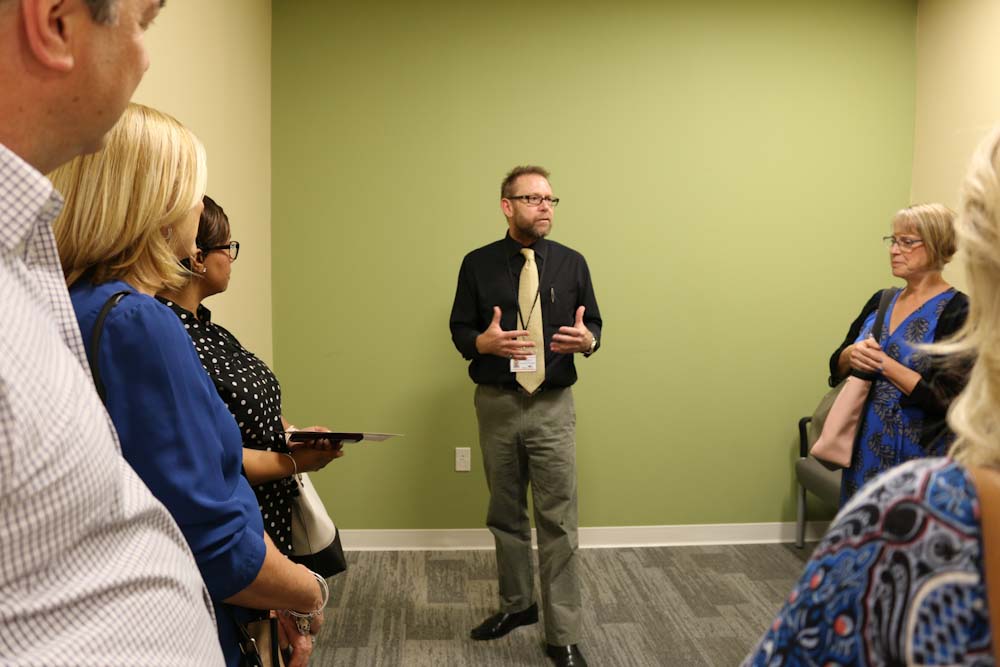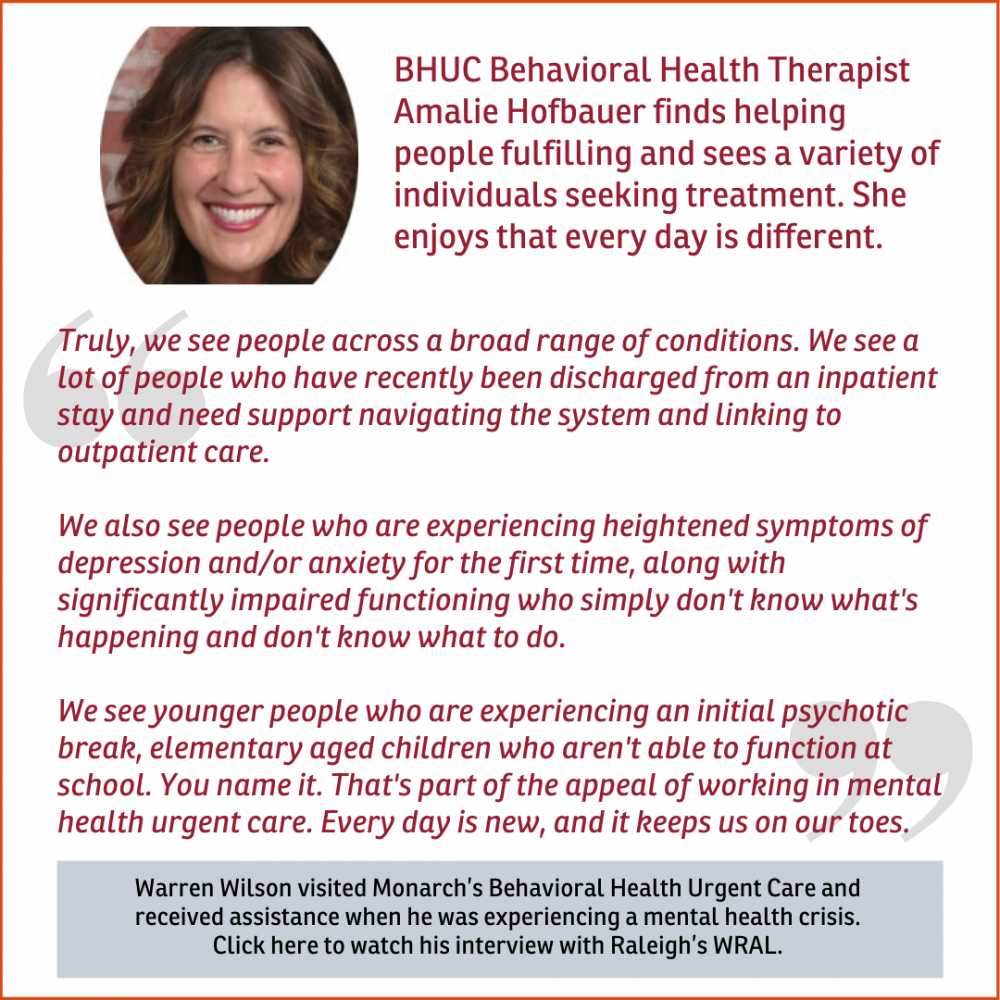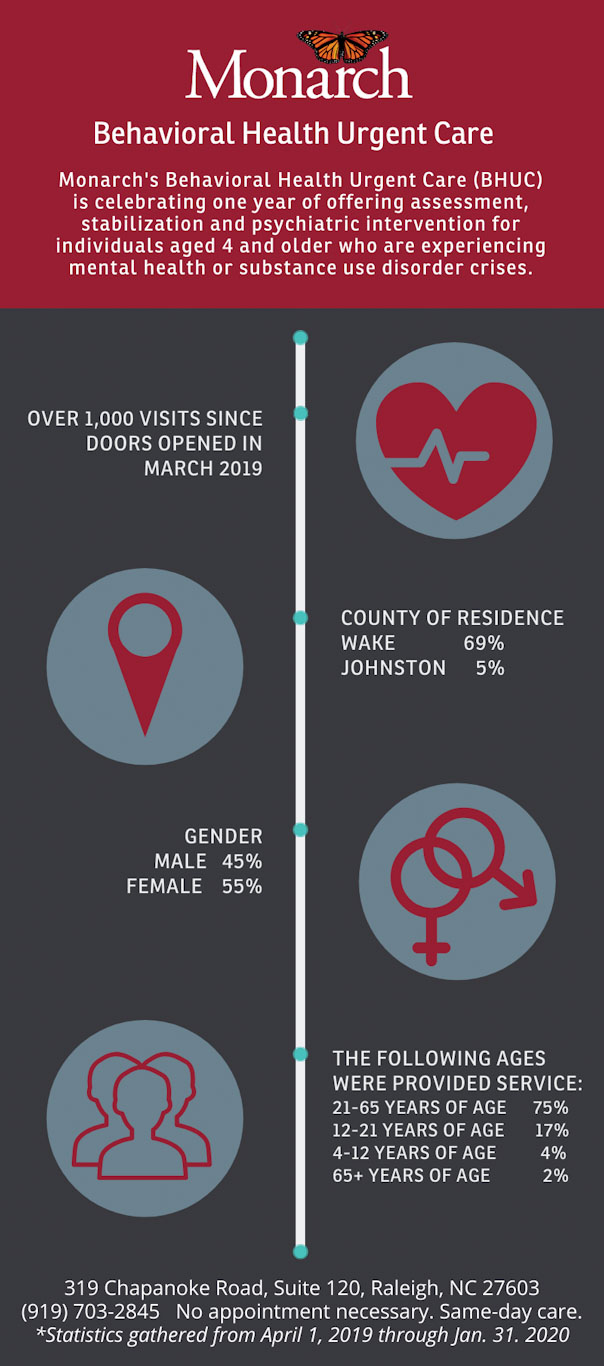Monarch’s Behavioral Health Urgent Care Completes Inaugural Year in Wake County

BHUC’s Douglas Cox, M.A., LPCS, LCAS-A, behavioral health therapist, explains services during the open house held in March 2019.
Monarch’s Behavioral Health Urgent Care (BHUC), located in Raleigh, is celebrating the completion of its inaugural year and becoming a vital Wake County resource providing crisis mental health services to individuals in need.
The BHUC offers same-day care with no appointment providing assessment, stabilization and psychiatric intervention for individuals aged four and older experiencing mental health or substance use disorder crises. Practice Administrator Brian Maxey explained that when a person seeks treatment a multidisciplinary team of licensed therapists and medical professionals spends an average of two to three hours assessing, treating and connecting the person with community resources.
Maxey indicated that the BHUC most often treats individuals who fall in a “gray area” somewhere between needing more than a primary care physician can provide but not requiring a visit to the emergency department that may result in a hospital admission: “Within the mental health care system, we are here to help the folks who fall through the safety nets that exist.”
 During an individual’s visit, the BHUC medical staff evaluates the reason treatment is sought and what preventative measures, and link to resources, can be established to prevent seeking repeated medical assistance, as well as including family members in the healing process. “We are trying to be the glue that puts the pieces back together,” Maxey said.
During an individual’s visit, the BHUC medical staff evaluates the reason treatment is sought and what preventative measures, and link to resources, can be established to prevent seeking repeated medical assistance, as well as including family members in the healing process. “We are trying to be the glue that puts the pieces back together,” Maxey said.
Amalie Hofbauer, LCSW, CCS, LCAS-A, who has worked in community-based behavioral health crisis, inpatient psychiatric services and on a crisis stabilization unit, and who is currently a behavioral health therapist at the BHUC, appreciates her role supporting individuals in evaluating needs across the social determinants of health.
“We’re not giving you meds and saying, ‘good luck.’ Our staff will make every effort to ensure each patient who leaves the BHUC not only has the resources they need, but also the ability to access them,” Hofbauer said.
To identify and best meet the needs of the communities it serves, the BHUC engages with key partners such as health care agencies and first responders. Crisis and Assessment Services, through the University of North Carolina (UNC) Health Care at WakeBrook, refers individuals in need to the BHUC.
WakeBrook’s Crisis and Assessment Services Clinical Supervisor Helga LeMaster, MSW, LCSW, appreciates being able to access the BHUC as a resource. “Having a local resource that is about seven minutes away is very convenient for us to refer and that has been very helpful,” LeMaster said, adding that her team commends the timely response of the BHUC staff when determining referral options for a person seeking help but whose needs may be more appropriately suited to the BHUC.
“The BHUC becomes a great bridge to prevent hospitalization from happening,” LeMaster observed. “I treasure our partnership and how the BHUC responds quickly when we are working with patients that are already connected to them.”
with patients that are already connected to them.”
Monarch Behavioral Health Vice President of Operations Robin Henderson-Wiley, MPA, agrees that the BHUC is having an impact on the mission to divert individuals in need of immediate mental health assistance away from traditional emergency departments.
Henderson-Wiley pointed out that individuals who visit a traditional hospital emergency department for mental health support may often wait weeks for an appointment. “Would all 1,000 people we supported in the past year have presented to an emergency department? Probably not. However, at least 25 to 30 percent of individuals who walked into the BHUC were diverted from local emergency departments because the service provides the appropriate alternative,” noted Henderson-Wiley.
Hofbauer said she also sees signs that the BHUC has been well received within the community, noting that the Wake County Public School System has indicated their appreciation of mental health services available for youth.
Henderson-Wiley said staff and leadership are looking forward during the second year to strengthening and developing new collaborations with local hospitals, emergency departments and psychiatric hospitals, as well as community providers. In addition, future considerations are to incorporate primary care services as part of the BHUC service offerings.
For more information, visit the BHUC website page or call (919) 703-2845.
Photo caption: Above right, Douglas Cox, M.A., LPCS, LCAS-A, behavioral health therapist, explains services during the BHUC open house held in March 2019.
Posted on: Monday March 30, 2020
